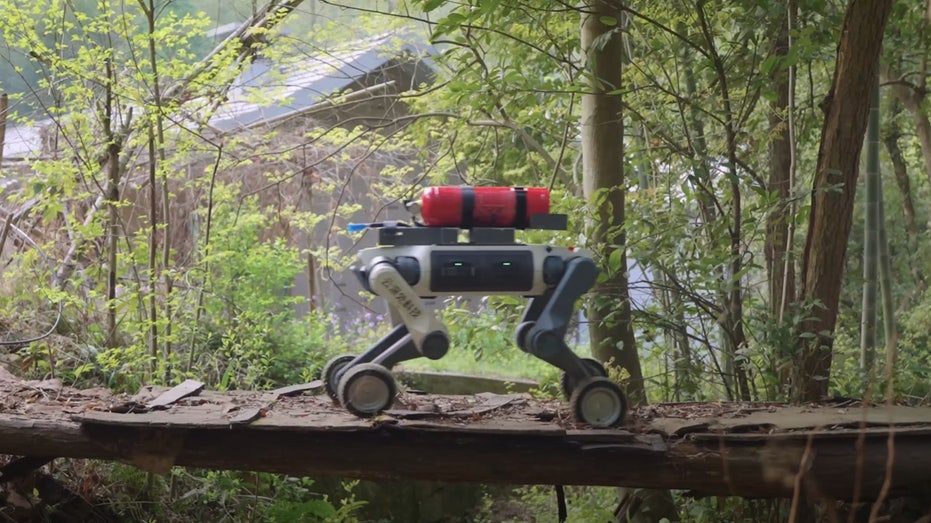Deep Robotics, a pioneering company from China, has introduced an innovative four-legged robot that is engineered to excel in extreme environments where human presence is often limited. Meet the Lynx M20, the latest advancement building on the agility and functionality of its predecessor, the Lynx robot dog.
Versatile Utility Across Multiple Industries
The Lynx M20 is designed for a wide range of applications, making it an invaluable asset in various sectors. Whether it’s conducting inspections at industrial sites, responding to emergencies, supporting scientific research, or managing logistics operations, this robotic marvel is equipped for the task at hand.
Advanced Mobility for Challenging Terrain
One of the standout features of the Lynx M20 is its unique combination of wheels and legs, allowing it to traverse even the most difficult terrains. Operating at an average speed of 4.5 mph, the robot can reach up to 11 mph in optimal conditions. It can effortlessly walk and climb obstacles thanks to its independent wheel-locking mechanism, making it capable of navigating rugged mountain paths, muddy wetlands, and urban ruins.
Cutting-Edge Navigation and Monitoring Systems
Equipped with a 96-line lidar system, the Lynx M20 boasts 360-degree awareness and impressive navigation capabilities. It features a front-facing wide-angle camera for livestreaming and bidirectional lighting, enabling it to operate effectively in dark or low-visibility environments. This makes it an ideal choice for inspections and emergency responses.
Intelligent Adaptation with AI Technology
What sets the Lynx M20 apart is its sophisticated artificial intelligence. The robot utilizes AI motion-control algorithms that enable it to autonomously perceive and adapt to its surroundings. This technology allows it to adjust its posture and gait for diverse terrains, from rocky trails to cluttered ruins.
Thanks to reinforcement learning, the Lynx M20 continually enhances its performance, learning from past experiences to tackle new and unforeseen challenges. Unlike robots that rely solely on pre-programmed instructions, the Lynx M20 actively makes decisions, becoming smarter with each mission.
Robust Design for Extreme Conditions
The Lynx M20 is built to endure harsh environments, featuring IP66 water and dust resistance. It operates efficiently in temperature ranges from -4°F to 131°F, making it suitable for a variety of weather conditions. Weighing in at 72.8 pounds, it can carry payloads of up to 33 pounds, climb obstacles of 31.5 inches, and navigate inclines of up to 45 degrees. With a runtime of 2.5 to 3 hours per charge and a hot-swap battery system, it minimizes downtime and maximizes productivity.
Upgraded Features with the Pro Version
For those seeking even more functionality, the Lynx M20 offers a Pro version that includes features like autonomous charging, SLAM-based positioning, and advanced navigation tools. Additionally, it has enhanced connectivity options, such as USB and Gigabit Ethernet, to further augment its capabilities.
Potential Impact on Industry Operations
While the price of the Lynx M20 has not yet been disclosed, Deep Robotics’ standard Lynx robot dog is estimated to cost around $18,000, suggesting that the M20 may fall into a higher price bracket.
For professionals in construction, energy, logistics, or emergency response, the Lynx M20 could revolutionize operations. Its ability to navigate rough terrain, carry heavy loads, and operate in extreme weather means it can access areas that are hazardous or impossible for human workers.
Whether employed for inspecting power lines after inclement weather, transporting supplies across challenging work sites, or assisting in disaster recovery efforts, this robot is engineered to enhance safety and operational efficiency.
Conclusion: A Game-Changer in Industrial Robotics
The Lynx M20 is more than just a robot; it is a robust, intelligent machine designed to tackle some of the most demanding jobs. By integrating wheels and legs, it achieves mobility that sets it apart from traditional robots, making it ideal for challenging terrains and adverse conditions.
As industries continue to evolve, the introduction of advanced robotic solutions like the Lynx M20 may significantly improve workplace safety and efficiency. What are your thoughts on how such industrial inspection robots could transform your sector? Share your insights!
